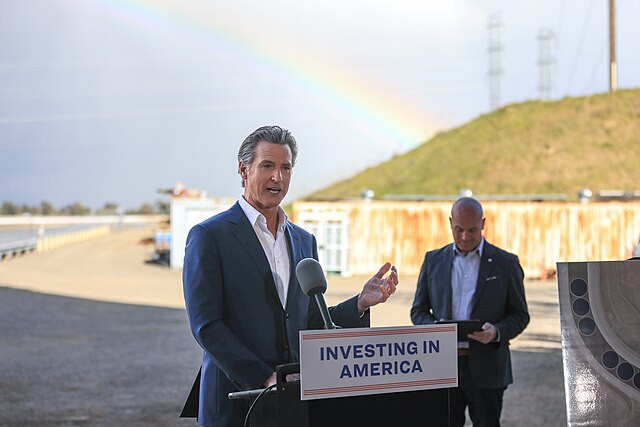California Governor Gavin Newsom announced plans to reinstate a state rebate program for electric vehicle (EV) purchases if the federal government eliminates its $7,500 tax credit for zero-emission vehicles (ZEVs). Newsom's statement, made Monday, reaffirmed the state's leadership in clean transportation and its commitment to making EVs accessible for consumers.
"We will intervene if the Trump Administration eliminates the federal tax credit, doubling down on our commitment to clean air and green jobs in California," Newsom said. "We're not turning back on a clean transportation future - we're going to make it more affordable for people to drive vehicles that don't pollute."
The proposed state rebate program would be funded through California's Greenhouse Gas Reduction Fund, which collects revenue from polluters under the state's cap-and-trade program. However, any funds allocated for EV rebates would have to compete with other initiatives supported by the fund, including renewable energy, sustainable housing, and water recycling projects.
California's original Clean Vehicle Rebate Program, which was phased out in 2023, helped fund more than 594,000 vehicles and saved over 456 million gallons of fuel during its operation. The new program would incorporate changes to "promote innovation and competition in the ZEV market," Newsom's office stated.
The governor's announcement coincided with the news that California has surpassed 2 million ZEVs sold, solidifying its position as the nation's leader in clean transportation. In the third quarter of 2024 alone, Californians purchased or leased 115,897 ZEVs, accounting for 26.4% of all new vehicle sales in the state, according to the governor's office.
California's support for ZEVs extends beyond incentives for buyers. The state has invested heavily in expanding its charging network, with over 150,000 public or shared private chargers and more than 500,000 at-home chargers installed statewide. Federal funding from the Infrastructure Investment and Jobs Act has also been allocated to install 458 fast chargers along key highways, with an additional $81.7 million approved for next year.
The state's investment in infrastructure is part of a broader effort to ensure ZEV accessibility for all Californians. Programs like the Zero-Emission Vehicle Infrastructure Plan (ZIP) aim to remove barriers for low-income communities, prioritize shovel-ready projects, and establish reliability standards for charging stations.
California's aggressive ZEV policies are supported by regulatory mandates that require automakers to increase their production of electric vehicles. Newsom's 2020 executive order stipulates that 35% of new car sales must be ZEVs by model year 2026, with a target of 100% by 2035. While automakers are obligated to meet these thresholds, consumers will ultimately determine whether the goals are reached.
The state's focus on clean transportation isn't limited to personal vehicles. California has allocated $102 million to install charging and hydrogen fueling stations for zero-emission trucks along Interstate 5 and other freight corridors. Additionally, $500 million has been set aside to deploy 1,000 ZEV school buses.
The potential elimination of the federal tax credit has caused concern among automakers and consumers. Introduced under the U.S. Energy Policy Act of 2005, the credit has been a key driver of EV adoption, reducing sticker prices by up to $7,500 for eligible vehicles. Governor Newsom's proposal aims to fill the gap if the federal incentive is rescinded, ensuring California remains at the forefront of the transition to clean energy.
As California continues to lead the nation in ZEV adoption, Newsom emphasized the state's commitment to building a cleaner, more sustainable future. "Consumers continue to prove the skeptics wrong - zero-emission vehicles are here to stay," he said. The proposed rebate program, coupled with ongoing investments in infrastructure and innovation, underscores the state's determination to maintain its leadership in the fight against climate change.






